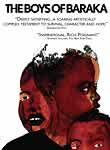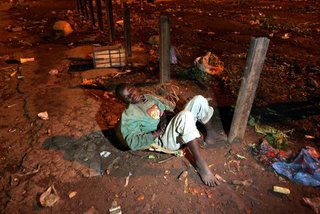
Most people know about my affinity for Netflix. I rarely watch television. I just queue DVDs and watch movies (cuz Im not found of going to theatres), catch up on shows (cuz like I said, I rarely watch tv), and watch documentaries (netflix has got a great selection). So last night I watched The Boys of Baraka. This is a must see film for all black males, anyone concerned with the plight of black children, or anyone who doesnt understand the conditions facing poor children in America.
As the blurb reads: "In an experimental program to reduce the rate of juvenile delinquency, the city of Baltimore sent a group of 12-year-olds deemed "at risk" to a boarding school in Kenya, affording the boys the rare opportunity to turn their troubled lives around. Focusing on four of the youths, this compelling documentary follows the students as they struggle to overcome the obstacles of their past in their hopeful bid for a shot at a brighter future."
With as much exposure as I've had to inner city youth and scholarly research I've done on their plight, this documentary still revealed a great deal to me. I am still unable to fathom the fact that in order to face a brighter future, these young men are taken out of the streets of Baltimore and taken to Kenya. The educational system in most of sub-saharan Africa though rigorous is severely lacking in resources. However, these boys ended up learning in one year in Kenya more than they did throughout years of schooling in Baltimore city schools. I was also impressed by the level of determination the children showed. They were aware that their environments were conducive to failure and were willing to move to a completely foreign environment in order to better themselves. I found many of the children to be smarter than their parents, who were not working nearly as hard as their sons to improve their quality of life.
However inspiring this film was for me, it was still troubling in many ways. I was disappointed that though the Baltimore recruiter for the Baraka school was a black woman, all but one of the teachers, counselors, and administrators of the program were white. These boys were in need of more than educational and psychological counseling. They needed to see Black men as role models encouraging them to make it because they had as well. This was lacking in the program and is lacking overall in most communities. Most of the boys did not have their father's or even other males in their households and this most definitely has an effect on their outlook of their future.
Overall, this is a great documentary and everyone needs to see it.



